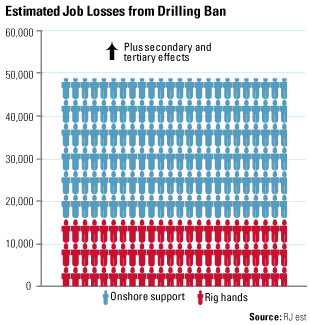While the world waits for oil to stop gushing from the ocean floor, a large group of Americans are waiting to go back to work.
Offshore drilling has been shut down since the Deepwater Horizon accident in mid-April that claimed 11 lives and started the massive Gulf of Mexico spill. The longer it lasts, the more damage it will do to America’s energy sector.
 Each of the 33 deepwater rigs operating in the Gulf prior to the drilling ban employed roughly 1,500 people and generated $1 million a day in economic activity, according to estimates by energy analysts at Raymond James. If the moratorium lasts a full year, the result could be a $12 billion drop in GDP and a loss of 50,000 jobs.
Each of the 33 deepwater rigs operating in the Gulf prior to the drilling ban employed roughly 1,500 people and generated $1 million a day in economic activity, according to estimates by energy analysts at Raymond James. If the moratorium lasts a full year, the result could be a $12 billion drop in GDP and a loss of 50,000 jobs.
These are well-paying jobs, especially for the region. The typical support and lower-level workers earn up to $4,000 a month, and specialized positions pay well more than double that amount, according to the New York Times. In all, the idled rigs represent at least $165 million in monthly wages.
These workers, not Big Oil, are the ones bearing the brunt of the drilling ban and the politicking in Washington. It’s an inconvenience for ExxonMobil, Chevron and other major oil producers, but they can turn their attention to opportunities off Brazil, West Africa or Southeast Asia and come back when things settle down. The smaller companies that service and supply these rigs (and employ most of the workers) won’t be able to follow.
Laborde Marine, a service boat operator in the Gulf, wrote to Louisiana Sen. Mary Landrieu and Gov. Bobby Jindal to beg them to rethink the moratorium, which has idled the company’s 21 vessels. More than 4,000 deepwater wells and 700 ultradeepwater (depths of over 5,000 feet) wells have been drilled in the Gulf of Mexico without environmental consequence, Laborde’s executives pointed out. They called the moratorium “kneejerk.”
Beyond the jobs and affected businesses, the moratorium stands to have a significant impact on energy supply. Deepwater wells accounted for 80 percent of total production in the Gulf of Mexico in 2009 and nearly 25 percent of total U.S. production. The deepwater Gulf accounted for almost half of non-OPEC production growth in 2009.
Raymond James estimates that a 12-month moratorium will reduce U.S. production by 400,000 barrel per day. This would cancel out the expected 2011 production growth for Canada and Brazil combined.
In addition, reserve estimates for the outer continental shelf represent 60 percent of the oil and 40 percent of the natural gas resources remaining in the United States, according to the Minerals Management Service (MMS).
There’s no doubt that the U.S. has to make sure the proper safeguards and government oversight is in place to prevent future environmental disasters. But a moratorium that strangles an industry that supports an entire region of the country would just create a second disaster. Two wrongs don’t make a right.
Disclosure: The following securities mentioned in the article were held by one or more of U.S. Global Investors family of funds as of March 31, 2010: Chevron, Exxon Mobil
- Bulenox: Get 45% to 91% OFF ... Use Discount Code: UNO
- Risk Our Money Not Yours | Get 50% to 90% OFF ... Use Discount Code: MMBVBKSM
Disclaimer: This page contains affiliate links. If you choose to make a purchase after clicking a link, we may receive a commission at no additional cost to you. Thank you for your support!


I agree. As a person who used to work in sales for a stafing agency I saw the connection between oil 7 gas and the economy. a resurant across the street offers discounts for oil & gas company workers. If they lose their jobs how mcuh will local resurants lose? It all trickles down. I'm sickend by the environmental damage but damagin the economy hurts too. BP had an exceptionally poor record many oil 7 gas companies take safety as a priority. Its like punnishinf first graders for the action of 1 child!!!
Life cannot be valued in dollar bills. Offshore drilling must be stopped again. One month after President Obama lifts the offshore drilling ban, the worst oil disaster in US history occurs. Should have stayed tough Mr. President, like you promised in the week before signing the bill. Too many times the oil industry wins with pleas like this that the "little man" is hurt. Well the "little man" is always the most resilient and can pick himself up and get working in a better industry. The oil spill off Santa Barbara in 1969 ignited the ban to offshore drilling. But the people with coins in their eyes got the dirty business going again, and Exxon Valdez happened. The public was outraged, and offshore drilling was unthinkable until the people forgot. Now this happens. Do not let these tragedies continue to repeat themselves. Tell the oil companies to spend their money on alternative energy research instead of offshore drilling. What a terrible thing greed is.
R U using your head? Where all the plastic coming from??? I want to see your comments after U will pay $7 per gallon, like in Europe, genius.